Current as of: February 27, 2026 - 16:25
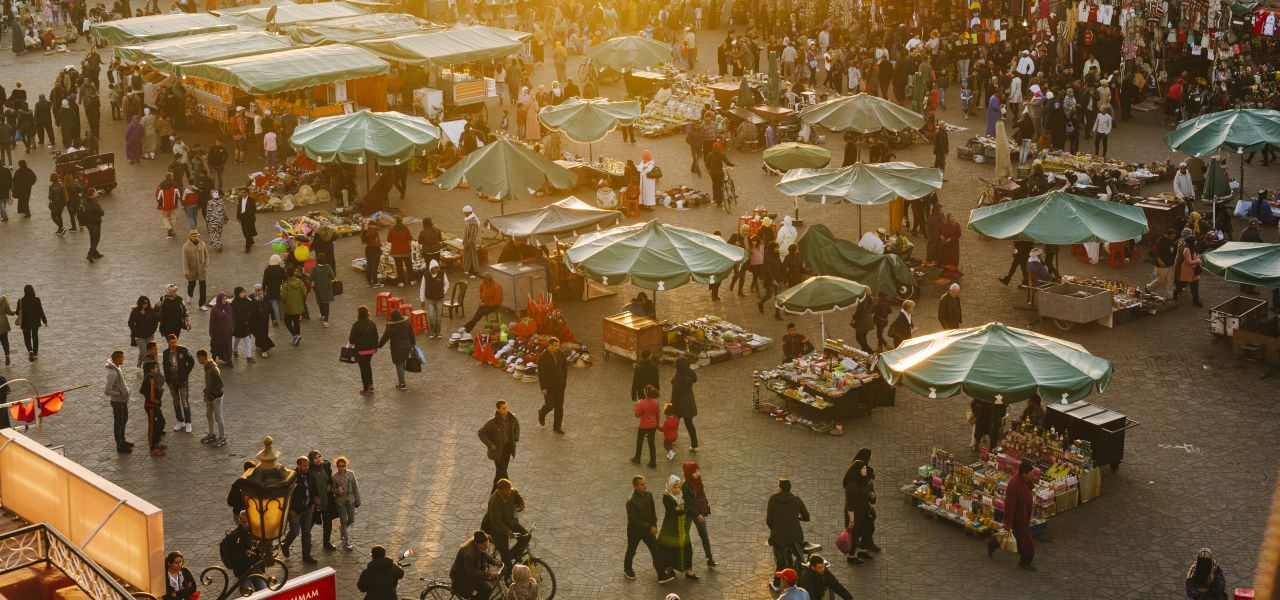
Discover Morocco Trip Notes
- Ways to Travel: Guided Group
- Destination: Morocco
- Programmes: Culture
-
Activity Level:
2 out of 7 - Easy & Moderate
- 12 Days: Land Only
- Ages: 16+
- Trip Code: AME
Trip Overview
Imperial cities, Sahara sands, Atlas peaks: find the true Morocco with the unrivalled expertise of our tour leader
Authentic Morocco, it’s in the ancient medinas, labyrinthine souks, Sahara dunes and rippling Atlas peaks… but only if you know where to look. Thankfully, we know just the person. Join your expert tour leader to immerse yourself in the Imperial cities of Marrakech, Rabat and Fez, sleep in the Sahara after a camel trek, and explore dramatic valleys, oases, gorges and mountains. Along the way, you’ll meet local people to hear their stories, witness daily life and enjoy natural beauty on scenic walks. By the end, you’ll know authentic Morocco isn’t just found in the landmarks, it’s something far deeper.
At a Glance
- Accommodation: 10 Classic nights (5 hotel, 2 riad, 3 lodge/auberge), 1 Simple night (Sahara camp)
- Travel by private minibus
- Group normally 5 to 16, plus leader. Minimum age: 16
Highlights
- Find authentic Morocco with the expertise of our local tour leader
- Immerse yourself in Imperial cities: Marrakech, Rabat and Fez
- Journey through the Sahara by camel and stay in a traditional desert camp
- Walk through the spectacular landscapes of Todra Gorge and the Ziz Valley
- Explore the grand ksar of Ait Benhaddou – a World Heritage site
- Gaze over the Atlas peaks from our mountain village retreat
Is This Trip for You?
This trip is rated Activity Level 2 (Easy & Moderate). For more information on our trip gradings, visit the Activity Level Guidelines page. If you have any queries about the difficulty of the trip, please contact us.
Journeys: To see the highlights of Morocco, there are some long journeys. We are not confined to our vehicle though, as there are plenty of photo stops and opportunities to stretch our legs. The approximate drive times are noted in the daily itinerary.
Weather: Temperatures are hot in summer (May to September), but we try to make the most of the coolest parts of the day for our sightseeing, so expect some early starts. During winter (November to March), the daytime is usually mild, but it can get cold at night, particularly in the desert and mountains, so pack some winter clothes.
Water: It is advisable to only brush teeth with bottled/boiled water and to avoid salads washed with tap water.
Ramadan: The holy month of Ramadan is expected to run from 17 February to 19 March 2026. One of the most important periods in the Islamic calendar, it is a special time to visit a Muslim country. Our tour leaders and drivers choose to work at this time so we continue to run trips; however, their energy levels may be slightly lower than normal. Many tourist sites, restaurants and shops run an amended schedule, but your tour leader knows how to adapt the itinerary to experience all the inclusions on this trip and maximise your experience during this special time.
Water: It is advisable to only brush teeth with bottled/boiled water and to avoid salads washed with tap water.
Group
There is a local tour leader and a driver plus local guides at various sites.
Adult min age: 16
Min group size: 5
Max group size: 16
Itinerary
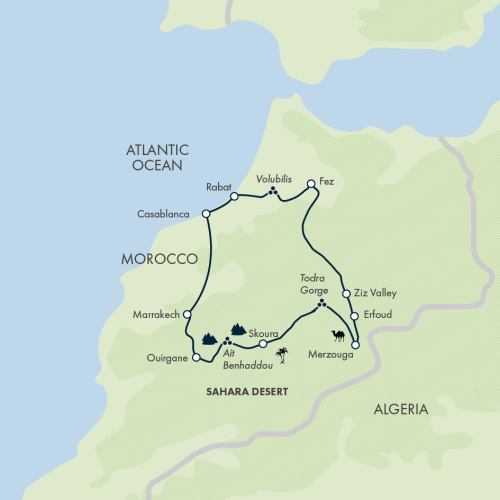
Land Only
- Start City: Marrakech
- End City: Marrakech
Land Only Itinerary
The adventure begins in buzzy Marrakech, a whirlwind of tradition and culture and an invigorating introduction to Morocco.
Around 6pm, say salaam alaikum to your tour leader and fellow travellers at the hotel, where we gather as a group for the first time to get to know each other and learn more about the adventures ahead.
Your tour leader then ensures a big Moroccan welcome over dinner.
Want to explore further? Secure pre-tour nights through your sales representative.
Accommodation: Hotel Ayoub (or similar)
Upgrade to a suite today – speak to your sales representative for more details
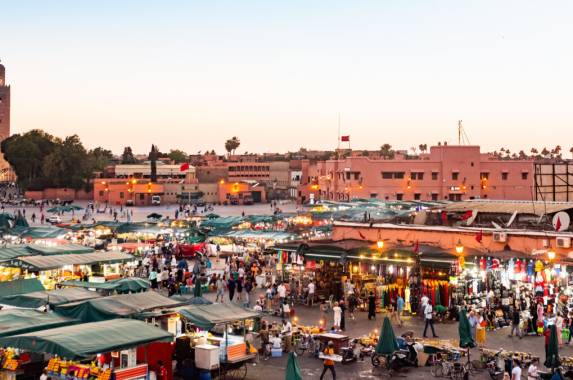
Join your tour leader this morning for an exploration of the city, which takes in: Koutoubia Mosque, the largest mosque in Marrakech; Djemaa El Fna, the main city square, packed with stalls and performers; and the souks, where you can meet the vendors and learn how to properly barter thanks to the guidance of your tour leader.
Then enjoy free time in the afternoon for solo exploration. For a spellbinding evening, consider visiting Chez Ali restaurant to watch their nightly show, which combines traditional songs, dances, fantasia and even equestrian aerobatics.
Accommodation: Hotel Ayoub (or similar)
Upgrade to a suite today – speak to your sales representative for more details
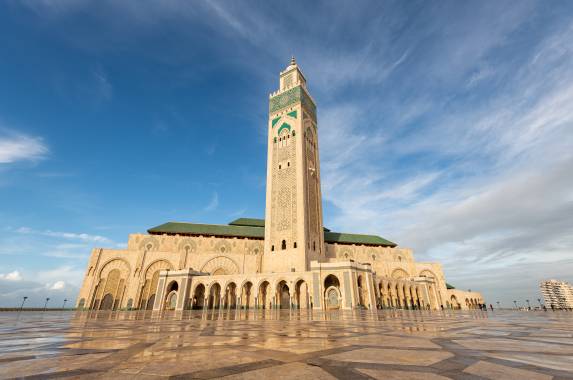
Bid farewell to Marrakech and transfer (2hr 30min-3hr) to Casablanca, taking a route through semi-arid plains with views of the Atlas Mountains.
Upon arrival, we visit the Hassan II Mosque, one of the largest in the world, which has a soaring 689ft (210m) minaret and a retractable roof to enable the sea breeze to cool the building. We have a guided tour of the mosque and the stunning ablutions hall with a local specialist. Please note: knees and upper arms must be covered.
After, we drive (1hr 30min) to Rabat, the capital of Morocco. Here, we have free time to explore. Although mostly modern, Rabat has an excellent old town, where you can see distinctive buildings with Moorish and Andalusian designs. Also visit the Jewish Quarter (Mellah) before continuing to the busy souk to sample locally made treats, such as harsha (a semolina bread) with amlou (a special almond paste).
Accommodation: Imperial Boutique Hotel or Le Musee Hotel (or similar)
Depart Rabat this morning and transfer (4hr 30min) to Volubilis, the largest and best-kept Roman ruins in Morocco. Under the Romans, it was an affluent city. This can be seen in the beautiful second-century forum, the basilica and the capitol. We wander through the streets, discovering remains of townhouses with mosaic floors and see baths, oil presses, aqueducts and shops, all of which reveal the daily lives of the inhabitants.
After exploring this site with a local guide, we transfer (one hour) to the ancient city of Fez.
Accommodation: Riad Tafilalet or Fes Tresors or Palais Al Firdaous (or similar)

Join your tour leader today for an immersive guided tour of Fez, the intellectual and religious centre of Morocco. Our five to six-hour exploration takes us to landmarks of the city, including the ornate city gate known as Bab Boujloud and the historic madrasas (theological colleges) of Al-Attarine and Bou Inania, plus the Jewish District (Mellah).
No exploration of the city would be complete without a visit to the medina, one of the largest in the world, an immense warren of souks, home to thousands of craftsfolk with their tiny shops opening onto the narrow alleyways.
Accommodation: Riad Tafilalet or Fes Tresors or Palais Al Firdaous (or similar)
Bid farewell to Fez and transfer (five to six hours) to the Ziz Valley. En route, we stop at a women’s co-operative to learn more about their work, while also having the opportunity to contribute to the rural economy.
Upon arrival, we have a guided tour in the Ziz Valley, before settling into our accommodation for the night.
Accommodation: Maison Vallee du Ziz (or similar)

Continuing our journey, we drive (one hour) to Erfoud. Though small, this oasis town has become known for fossils, which are excavated locally and cut, carved and polished by master crafters. Spend time here browsing the fossil markets and enjoying lunch before we complete our journey (one hour) to Merzouga, on the edge of the Sahara.
Upon arrival, we leave our main luggage at a local inn, taking only what we need for the desert in an overnight bag. We then meet our transport: a caravan of camels led by cameleers. They’ll show you how to mount and ride your camels, before we start our trek (45-60 minutes) into the dunes. There’ll be time for photo stops and to watch sunset, before we arrive at our camp, where we enjoy dinner and music under the stars.
Accommodation: Akabar camp (or similar)
Leaving the Sahara, we journey (five hours) to Todra Gorge, a dramatic limestone tunnel formed by the River Todra. Here, we walk (45-60 minutes) along a narrow road with plenty of photo opportunities. Of course, there are the usual pop-up souvenir stalls to tempt you.
We then visit a local family home for lunch (paid for locally). Aside from enjoying delicious Moroccan cuisine, this is also an excellent chance to experience traditional Moroccan life, which your tour leader will be happy to talk you through.
After, we depart for Skoura, an oasis town of rammed-earth buildings, where we can unwind with a dip in the pool.
Accommodation: Kasbah Ait Benhadda (or similar)

Join a local guide today to walk through the palm groves of Tinghir, an oasis at the end of Todra Gorge. Along the way, we hike through a beautiful landscape of red rocks, punctuated by the green of the palms and other vegetation, while also seeing the clay villages and people who live there.
Accommodation: Kasbah Ait Benhadda (or similar)
Leave Skoura this morning and transfer (1hr 30min) to the well-preserved ksar (fortified village) of Ait Benhaddou. This World Heritage site is one of the most spectacular in the Atlas range, and the location of several Hollywood films including Gladiator (2000). Here, we meet a local guide to tour the atmospheric alleys and see the earthen walls of the dwellings.
After, we continue (four to five hours) through the mountains to Ouirgane, a rural village in Toubkal National Park.
Accommodation: Ouirgane Ecolodge or Auberge Chez Momo (or similar)

After a busy few days of adventure, today has been left free for you to relax in your beautiful mountain setting. You can unwind by the pool, enjoying the views, or join a walk with a local guide around Lake Ouirgane and the surrounding area.
This evening, we come together for a farewell meal, in which we can unite and discuss our favourite moments from the tour.
Accommodation: Ouirgane Ecolodge or Auberge Chez Momo (or similar)
You’ve explored Imperial cities, camped in the Sahara and walked through some of the most spectacular landscapes in Morocco; but, after breakfast, we transfer (two hours) to Marrakech, where our adventure ends at the airport.
Alternatively, if you’d like to extend your adventure, perhaps in Marrakech or the relaxed seaside cities of Essaouira or Agadir, speak to your sales representative to discuss our large range of extension options.
Extend Your Trip
Marrakech Hotels & Riads
A city of vibrant souks, ornate palaces and fragrant gardens, where ancient traditions meet modern energy. Extra nights here give you time to wander the medina, relax in hidden courtyards and soak up the city’s atmosphere at your own pace. Here are a few of our favourite hotels to inspire your stay:
Kenzi Rose Garden: Set within expansive landscaped gardens in Marrakech’s Hivernage district, this comfortable hotel offers a peaceful retreat close to the city’s main attractions. With multiple pools, spacious rooms and a relaxed atmosphere, it’s an ideal base for unwinding after exploring the medina.
Riad Moullaoud: Tucked away in the heart of the medina, this traditional riad offers an intimate and authentic Moroccan experience. Centred around a tranquil courtyard with a small pool and rooftop terrace, it’s perfect for travellers wanting charm, character and easy access to Marrakech’s souks.
Es Saadi Marrakech Resort: Located in the upscale Hivernage area, this stylish resort combines luxury accommodation with lush gardens, art-filled interiors and excellent dining. With a large spa, pools and views towards the Atlas Mountains, it offers a refined and relaxing end to your adventure.
This is just a glimpse of what’s possible. Speak to your sales representative, who can guide you through the options and arrange everything for you.
Accommodation
Hotels, riad, lodges/auberge, Sahara Camp

We aim to secure locally owned accommodation that is well located, offers good value for money, and plenty of comfort. To help you find your ideal adventure, each trip is given a Comfort Level rating, which indicates the overall standard of accommodation. For more on our ratings, see our Comfort Level guidelines.
Worth knowing
- Tailor your trip: Extend your adventure by securing extra hotel nights before or after the main itinerary. Speak to your sales representative to book.
- Private rooms: Like most tour operators, we room solo passengers together. If you’d prefer to have a private room, it’s normally possible to do this for a supplement. Speak to your sales representative to book.
- Room upgrades: Upgrade to a higher category of room on Day 1 and 2 of the itinerary – speak to your sales representative for more details.
- Single rooms: You can request a single room on this trip subject to availability. The single supplement applies to hotel nights only and therefore does not cover any nights in the mountains, desert or Sahara camp.
- In the Sahara camp, we typically stay in two-person tents; however, if the campsite is full, we use four-person tents.
Single supplement from £ 310
Food & Drink
Moroccan food is, generally speaking, excellent. Breakfasts usually consist of bread and jam with coffee or tea. Where meals are not included, budget for the following approximate prices.
- Lunches: 60-100 dirhams (US$6-US$10)
- Dinners:
- In cities: 80-250 dirhams (US$8-US$25)
- In small towns and villages: 60-120 dirhams (US$6-US$12)
- Drinks in restaurants
- Soft drinks: 10-20 dirhams (US$1-1.90)
- Beer: 40-80 dirhams (US$4-US$8)
- Wine: 180 dirhams (US$18) and more
Vegetarians can be catered for, but there is a fairly limited choice of vegetarian couscous, tajine or omelettes. This is particularly the case during the more rural sections of the trip. If you have special dietary requirements, inform us prior to the trip. If you have a specific medical/dietary need (eg coeliac or vegan), you may find it helpful to bring some food with you from home.
Transport
For most of this trip, we use a private bus, the size of which depends on the group size. The roads in Morocco are reasonably good and driving conditions in towns and on the plains are good. On mountain roads, the pace is slower. Buses usually have air-conditioning and heating but please note this is not up to European standards.
Weather & Seasonality
From April to June, and in September, Marrakech and the north are pleasantly hot, with temperatures averaging 26C (79F) in the day and falling to 16C (61F) at night. It is unusual for there to be much humidity, so it is quite pleasant except at midday when the sun is very strong. Desert temperatures are like those in Marrakech, with the nights usually a little cooler and the days a little hotter. Mountain temperatures are cooler than in Marrakech.
In winter, the daytime temperatures in Marrakech are around 18C-22C (64F-72F) with night temperatures falling to 4C-7C (39F-45F). The days should be sunny and a particularly attractive feature of winter is the clear views of the snow-covered Atlas. The temperatures in the south are generally a couple of degrees higher than those north of the mountains. There is a small chance of rain and it has even been known to snow very infrequently in January and sometimes February on the higher desert plateau (in which case it is cold at night and early in the morning on the southern side of the Atlas).
Joining Instructions
Key information
Hotel: Hotel Ayoub, Rue Ibn Qodama, Marrakech 40000
Phone: +212 5244-33374
Recommended arrival time: Hotel check-in is from 2pm, we usually have a welcome briefing around 6pm on the evening of the first day.
Airport: Marrakech Menara Airport (RAK)
Getting to the start hotel
The start hotel is approximately a 20-minute drive from the airport. Exodus provides free arrival transfers to the start hotel from the airport for all customers.
If you would like further information on joining this trip, please speak to your sales representative.
Catching your return flight
The adventure ends at Marrakech Airport. Speak to your sales representative for the transfer times.
Marrakech airport
The amount of time it takes to get through Marrakech Airport can vary considerably. Therefore, we suggest you mitigate for delays and allow two hours to get through immigration, security and baggage reclaim on arrival. Take a pen with you to complete the arrivals form and have the details of your accommodation to hand for this purpose. Operators are not allowed to wait inside the terminal building for clients, so please find your Exodus representative outside the main doors.
Upon departure from Marrakech, we suggest allowing three hours to navigate the airport: check in, bag drop, immigration and security can take even longer on exit. The airport doesn’t accept mobile boarding passes, so we suggest having a printed boarding pass to avoid subjecting yourself to further delays.
Full joining instructions including local emergency numbers will be sent to you as part of our Final Joining Instructions. If you do not receive these at least a week before departure, or require them earlier please contact our office or your travel agent.
Location start: Marrakech
Location end: Marrakech
What To Take
Essential Equipment
- Sunhat, sunscreen and sunglasses
- Small backpack (can double as overnight bag for Sahara camp)
- Lightweight walking shoes with ankle protection
- Torch (flashlight)
- Light jacket
- Swimwear (some hotels have swimming pools)
- Towel (this is for the traditional hammam in the mountains)
For November to March departures, you also need:
- Fleece jacket/waterproof jacket
- Gloves and hat
- Warm sleepwear
Although Morocco is a Muslim country, the dress code in the large cities is not as strict as it used to be, so it is fine to wear tops with no sleeves and shorts. When entering mosques and in more rural areas, it is best to be more modest, for example, wearing clothes that covers below the knees and shoulders. Additionally, women should avoid wearing revealing clothes.
Water included: Plastic bottles are a big issue in many countries where recycling isn’t yet widely available; they often end up in landfill or get burned. Both processes are harmful to the environment and we would like to reduce our impact here. For your trip, we provide an alternative to single-use plastic bottles to reduce the plastic used. This means that safe drinking water will be available throughout; all you need to do is bring a bottle to refill along the way. Please add this to your packing list.
Spare space? If you have room in your luggage, consider bringing items to donate to schools and villages − your tour leader can assist in delivering them once you’ve arrived.
Much-need items included:
- School stationery, including pens, pencils, crayons, erasers, rulers and notebooks
- Card games
- Balls, including (deflated!) footballs and tennis balls
- Toiletries, including toothpaste, toothbrushes and soap
Practical Information
Passport
Remember to check the expiration date of your passport if travelling internationally. Many countries require your passport to be valid for at least six months after the date of your scheduled return.
Visa
Travellers from the UK, US and EU normally do not need a visa to enter Morocco. Please note, visa requirements often change and it is your responsibility to obtain any required visas for this trip. Therefore, we recommend that you check with the nearest embassy or consulate of your chosen destination(s), including any countries you may be transiting or transferring through.
Some local governments provide guidance on what visas their citizens need. To help, we’ve gathered a selection of useful links below.
• Australia: www.smartraveller.gov.au/destinations/africa/morocco
• Canada: www.travel.gc.ca/destinations/morocco
• United Kingdom: www.gov.uk/foreign-travel-advice/morocco/entry-requirements
• USA: www.travel.state.gov/content/travel/en/international-travel/International-Travel-Country-Information-Pages/Morocco.html
Vaccinations and Health
There are no mandatory vaccination requirements; however, tetanus, typhoid and hepatitis vaccines are all recommended.
There is evidence that Middle East respiratory syndrome coronavirus (MERS) is spread by contact with camels. This trip includes a sunset camel ride , which is undertaken at your own risk; we suggest that you visit the Travel Health Pro website which includes information about the virus.
Local Time
Morocco's time zone: Africa/Casablanca (UTC +00:00)
Electricity
Morocco's electricity: Plug types C (two round pins, European standard) and E (two round pins) – 220V, 50Hz
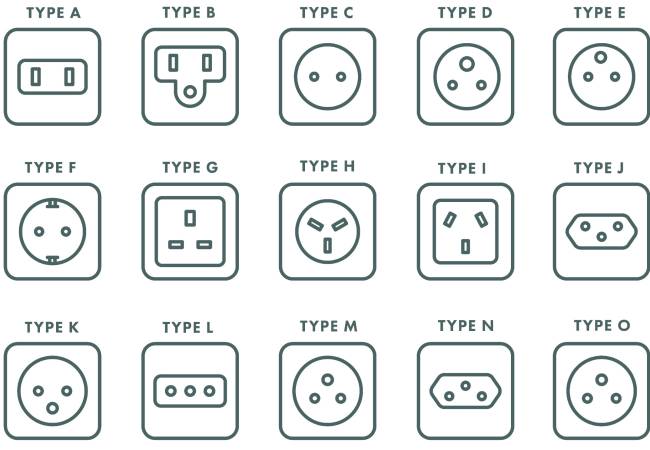
Money
Morocco's currency: Moroccan dirham (MAD), a non-convertible currency. You can only import/export a maximum of 2,000 dirham to or from Morocco.
ATM Availability
It is easy to use Visa/Mastercard at the ATMs in larger towns and cities. Credit cards are normally accepted for more expensive souvenirs, such as carpets (most shops charge up to five percent extra for the use of credit cards).
If you wish to exchange money, you can do so at the airport. Morocco only allows 2,000 dirhams to be imported or exported, but there is no limit on the amount of foreign currency you take. Ensure you keep hold of your exchange receipt as you may need to show it at the airport bank at the end of your trip, where it’s normally possible to change any unspent dirham notes back into euros, British pounds or US dollars.
Extra Expenses & Spending Money
Allow approximately 30-70 dirhams (US$3.30-US$7.70) per day to cover small souvenirs, soft drinks etc. See the Food & Drink section for more details on expenditure.
Tipping
Our local staff are paid fairly for their work. However, tipping is part of the local culture and generally expected. While tipping is at your discretion, our groups typically ask for advice on how much to give. Below are some recommendations:
Tipping kitty: We have found it useful for the group to have a kitty – about 600 dirhams (US$66) per person – to ease the confusion and embarrassment around tipping local staff (cooks, guides, hotel staff etc). If you do not wish to join the group kitty, do not feel pressured.
Tour leader and driver: Many also wish to tip the tour leader and driver at the end of the trip; we suggest 55-90 dirhams (US$6-US$10) a day per person for the tour leader and 20-35 dirhams (US$2-US$4) a day per person for the driver. This is completely at your own discretion and to be used as a guideline only.
Sustainability and Impact
As a certified B Corp, we’re on a mission to improve our social and environmental impact across all our adventures.
We do this through our innovative Thriving Nature, Thriving People plan.
This ‘nature positive’ approach is designed to help nature and communities thrive in harmony through practical solutions, such as reducing carbon and waste on our trips, supporting conservation projects through the Exodus Adventure Travels Foundation, and rewilding 100 square metres for every Exodus traveller.
Important Information
Your Safe Participation
When booking this trip, you should be confident in your ability to participate in all activities described in these Trip Notes. If you have any doubt about your suitability, please call us and ask to speak to one of the experts on this itinerary.
Although our leaders are well trained to deal with different capabilities, if they have any concerns about someone’s ability to safely take part in an activity, or their impact on other people’s enjoyment, we authorise them to take necessary action which, in some circumstances, may involve asking someone to miss that activity.
By booking this trip you agree to our Booking Conditions which clearly state that our leaders have the authority to do this. In these rare instances we will ensure anyone sitting out is safely provided for and offered alternative options where possible. Refunds will not be provided for activities missed and customers may be liable for additional costs incurred.
Seatbelts
All vehicles used by us should be equipped with working seatbelts, except where approved by us based on the vehicle type or journey. Wherever seatbelts are available, we require our customers to use them for their own safety, even where it may not be a legal requirement.
Travel Safety
For additional information please have a look at the travel safety advice page on our website.
How to Book
Speak to our friendly team of experts to plan your adventure:
- Check availability: our website shows real-time availability of our guided group tours, or contact our team by phone, email or live chat.
- Hold a space: You can provisionally hold a space on any guided group tour to give you time to finalise your travel plans.
- Confirm your booking: Payment of a deposit will complete your booking and secure your place on the trip.
After booking
You will receive a confirmation document and invoice, which includes extra information and guidance about your travel arrangements. Our dedicated Customer Operations team will help you with any pre-travel questions or arrangements and can easily add extensions or extra accommodation to your booking. Final Joining Instructions will usually be sent out two to three weeks prior to departure.
Adding transfers to your booking
If you have arranged your own flights and would like to add transfers to your booking, please provide your arrival and departure details to our Customer Operations team around four to six weeks before departure.
- Where free transfers are included, they are available for any flight but can only be added to your booking once we have received your flight schedule.
- Where group arrival and departure transfers are available, these operate at fixed times. You will need to arrive in time to meet the scheduled transfer. If the timings don’t align with your travel plans, our team can arrange private transfers once they receive your flight schedule.
Trip Note validity
Trip notes may be updated after booking; if any updates significantly impact the inclusions or itinerary you will be advised in writing. A link to the most up-to-date Trip Notes will be sent out with your Final Joining Instructions before departure.
The information in these Trip Notes is given in good faith. All holidays can be subject to unexpected changes, and occasionally it may not be possible to follow the itinerary as planned. In these circumstances we will make the best-possible alternative arrangements that maintain the integrity of the original itinerary.

